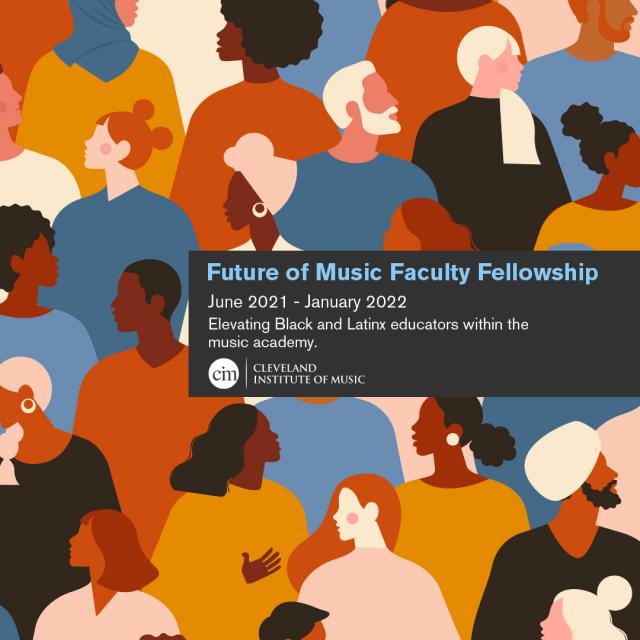CIM’s new “Future of Music Faculty Fellowship” aims to prepare Black and Latinx prospective educators
New CIM fellowship to support the future of Black and Latinx music educators.
February 12, 2021
“Intelligence plus character, that is the true goal of education” were among the most important words from Dr. Martin Luther King Jr. to educators. To serve and to teach are among the most revered aspects of academia. For such professions—no matter what field—representation is essential to the development of effective education. That is why the Cleveland Institute of Music created the “Future of Music Faculty Fellowship” to help support Black and Latinx musicians, to create an inclusive and diverse community in music education.
The fellowship will be awarded to 35 Black and Latinx music professionals who are pursuing or considering academic careers, preparing them with the skills, insights and networks to flourish professionally and influence generations of musicians. There will be a competitive application process for faculty wishing to apply.
Paul W. Hogle, President and CEO of CIM, emphasized the impact that the fellowship could have on promoting diversity and inclusion among not only educators but also the students.
“… Even as student bodies are growing more diverse, faculty remain predominantly white. Educators are a ‘missing link’ in accelerating efforts to diversify the field,” Hogle said. “With the Fellowship, CIM endeavors to change the career trajectory of Black and Latinx prospective and current faculty members as they influence students and discourse for generations to come.”
Such impact will be demonstrated “through a mix of inspiration, practical skill building, individual mentoring by experienced faculty and the cohort experience.” After the program, “fellows will be ready to seek their first—or next—faculty position in a music school or conservatory.”
The Fellowship is funded by the Sphinx Organization—a Detroit-based organization dedicated to transforming lives through the power of diversity in the arts. CIM has collaborated with them closely over the past five years.
Hogle elaborated, “we host the Sphinx Performance Academy for talented young string players each summer, advise and host the Sphinx LEAD program for Black and Latinx executives, present performances by the Sphinx Virtuosi and the Catalyst Quartet and applied for and received a Sphinx Venture Fund grant for this project.”
If accepted, every element of the program will be free of charge for fellows, including but not limited to traveling, lodging and registration for the in-person convening in January 2022.
The program will feature numerous faculty from prestigious music education institutions across the country, such as The Juilliard School, Vanderbilt University, Indiana University, Heifetz International Music Institute, and even an adjunct faculty from Case Western Reserve University’s Weatherhead Executive Education.
Keynote speakers for the program will be Simon Sinek, author of the bestselling book “Start with Why,” and Dr. Angela Duckworth, author of “Grit.” Hogle expressed that the program chose them “for inspiration and courage and context.”
Additionally, there will also be speakers from program faculty—made up of music school deans, administrators, university presidents, management and performance experts—who will explore “deep dives into the academic job market, navigating the faculty search process, effective teaching, politics in academia, peak performance, influencing at all levels and more,” according to Hogle. “Perhaps equally important, we’ve built in a mentorship component that pairs each fellow with a veteran music faculty member.”
The curriculum will cover both practical and soft skills for educators. The program is not limited to just skill development, as there will also be a powerful platform for fellows to showcase their skills to potential employers and career mentors. Below are the focus areas and key dates during the program:
Module 1 (June 25-27): The Academic Job Market;
Module 2 (July 30-Aug 1): Navigating the Search Process;
Module 3 (Aug 27-29): Effective Teaching;
Module 4 (Oct 22-24): The Politics of Academia;
Module 5 (Dec 3-5): Peak Performance and Influencing at All Levels.
Eligible applicants include Black and Latinx adjunct or junior faculty and professional musicians of all music genres and disciplines who are considering a career in academia. In terms of what the program is looking for, Hogle indicated that “preference will go to individuals who have completed a doctoral program in a field of music or [have completed all but their dissertation], and are actively pursuing a career in academia.” However, those with master’s degrees are also strongly encouraged to apply. So far, the application pool has been competitive, with 100 applicants so far after only two weeks of announcing the program. Nevertheless, there is still plenty of time to prepare and submit an application for the deadline of May 1.
Because of CIM’s mission to “empower the world’s most talented classical music students to fulfill their dreams and potential,” CIM is making efforts to do so not only its faculty, but the student body, as well. CIM supports their Black and Latinx students preparing for careers in classical music, at the conservatory level and through the Pre-College Musical Pathways Fellowship program. “I think that’s our area of focus for students in the short term,” Hogle remarked, “working with our own students to expand the definition of what is possible for the future of classical music.”




